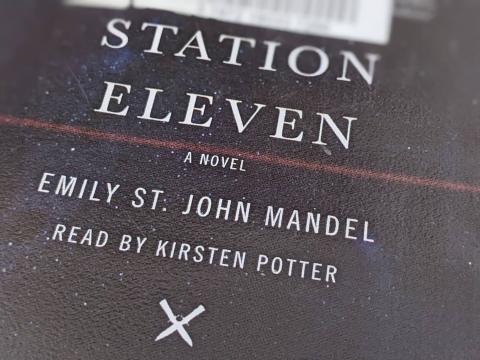I'm juuuuust about done listening to Emily St. John Mandel's novel Station Eleven, read by Kirsten Potter. The story bounces through about 25-40 years, fleshing out backstories in flashbacks of most of the present day characters surviving in a post-pandemic apocalypse. I checked it out both because my oldest kiddo is currently reading this in her English class, and because it's popped up a few times in my news feeds due to the flu-like pandemic that pivots the characters' lives. The blurb on the back of the audiobook sleeve states that the novel is "about the relationships that sustain us, the ephemeral nature of fame, and the beauty of the world as we know it." OK. I'm not buyin' it.

The blurb doesn't state that this is a statistically probable tale of what might happen if a pandemic quickly killed most of the people on the planet, and that's good, because I'd have a lot of doubts about that. But I'm not sure it fulfills the lofty and romantic promises that are written in the blurb, either. I can see the novel trying to stretch in those ways, but the events and descriptions that seem to make those stretches feel forced, artificial, and, as a result, unbelievable. Maybe I just prefer a novel with more poetic prose, or more meaningful metaphors.
The expedient infectiousness and lethality of the "Georgia Flu" are convenient, as the pandemic reaches global proportions in mere days, and the situation goes from bad to apocalyptic so fast, there isn't time for people to join factions over who caused it, and what should be done about it. Unlike the sharply satirical "Don't Look Up," Station Eleven doesn't dwell in the early days of the pandemic, or try to show what "most people" do, and instead, throws a handful of survivors into a Noah's Ark of sorts, letting the "old world" fade into near mythology. That's fine. It's a choice the author made, supposedly, to spend more time on what changes and what remains in the post-pandemic present. But it doesn't scratch the itch I had about looking into the behavior of different social orders when it comes to the prosperity of its citizens in the grips of a pandemic. There's very likely a novel (or three) out now that does that.
That said, in light of my own pandemic-related observations, St. John Mandel gets a few things right. There's a moment early in the outbreak when a character looks around them and considers everyone a potential vector of the disease. Yup. Felt that very strongly in late March, 2019. And several moments when various characters realize just how much quieter and darker it is with no electricity, traffic, or airplanes. This, too, seemed very real during the first major "lock down," so much so that I remember feeling a little shocked to see planes flying from time to time. I remember thinking, "who would risk their lives to fly somewhere right now?" Obviously (and thankfully) we never lost power, and we learned that proper mask wearing and social distancing could help prevent a lot of transmission. And most of the people who caught Covid, survived. But, dang, it's been scary.
And maybe that's it. Station Eleven just isn't scary enough. Everyone is just sort of like, "Welp. I guess we'll just have to hunt for our food and avoid the whackos." Most of the characters actually seem a bit cold, a bit emotionless, even when there's semi-obvious attempts to show heart, compassion, and longing. Our pandemic, THIS pandemic, has held the full spectrum of emotions, the real stories of real people, the impacts of the disease itself and all the ripples it has caused and continues to create, as well as a lot of hope that we'll get through this stronger than we were at the start. I have vivid memories of frantic people and empty shelves at the grocery store, of long emails from the school superintendent, of learning how to use Zoom and connecting remotely with friends and family, of bursting into tears when I felt it was finally safe enough to hug my parents again, of the piles of plastic take-out containers we accrued, of needing to calm myself when someone said it was all made up.
I understand that a book published before an actual modern pandemic occurred can't be expected to predict the outcome with any certainty. And no book will likely be "perfect" to any one reader, let alone me. But I wasn't moved in the way I thought was possible given the blurb and praise for the book. It did not teach me about soul-sustaining relationships, show me the effects of fleeting fame, or remind me of how beautiful this world is. Ah, darn those expectations.
FWIW, Kirsten Potter does a fine job reading the book. I'd listen to her again.
Comments